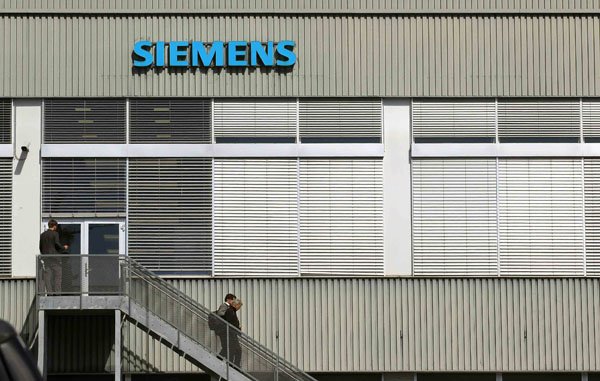
Siemens has denied allegations that it planted explosive devices inside nuclear equipment destined for Iran.
The German engineering company said it has “no business ties to the Iranian nuclear programme”.
An Iranian MP said the devices had been discovered before they could explode.
Iran is under UN sanctions and the MP did not say where the equipment had come from. Tehran is engaged in a standoff with Western countries which suspect it is building a nuclear bomb.
The UN’s nuclear watchdog, the International Atomic Energy Agency (IAEA), has rebuked Iran for refusing to suspend uranium enrichment.
Israel’s Prime Minister Benjamin Netanyahu has warned that Iran is only six or seven months from having “90%” of what it needs to make a nuclear bomb.
He has urged the US to draw a “red line” which, if crossed, would lead to military intervention.

Iran has insisted that its nuclear programme is solely for peaceful purposes, and warned that it will retaliate if it comes under attack.
A senior commander with Iran’s Revolutionary Guards said on Sunday that such a conflict would “turn into World War III”.
Brig. Gen. Amir Ali Hajizadeh told Iran’s al-Aram TV that “whether the Zionist regime [Israel] attacks with or without US knowledge, then we will definitely attack US bases in Bahrain, Qatar and Afghanistan”.
On Sunday, Javad Jahangirzadeh, a member of the presiding board of the Iranian parliament, accused the IAEA head Yukiya Amano of passing confidential information about Iran’s nuclear programme to Israel.
The charges against Siemens were made a day earlier by the head of the Iranian parliament’s security committee.
Alaeddin Boroujerdi said Iranian authorities believed the equipment “was supposed to explode after being put to work, in order to dismantle all our systems”.
“But the wisdom of our experts thwarted the enemy conspiracy.”
Alaeddin Boroujerdi said the explosives were planted at a Siemens factory and the company had to take responsibility.
The Munich-based German firm denied the charge. It said its nuclear division has had no business links with Iran since the 1979 Islamic revolution.
“Siemens rejects the allegations and stresses that we have no business ties to the Iranian nuclear program,” spokesman Alexander Machowetz said.
The Iranian accusation raises some intriguing questions:
• Has the Iranian MP simply got it wrong?
• Is Iran buying Siemens equipment through a third party?
• Is there something more underhand going on, with sabotaged equipment being sold with the secret approval of Western intelligence agencies?
In June 2010, a virus – nicknamed Stuxnet – was found to have infected computer systems at Iranian nuclear plants.
It, too, was connected to a Siemens product but the company denied all knowledge.
Unconfirmed reports linked the virus to a government agency, perhaps in the US or Israel.
The latest allegations deepen the mystery, says our Berlin correspondent.
The IAEA has been coming under increasing attack by Iranian officials.
In the latest allegations, Javad Jahangirzadeh was quoted by Iran’s English-language Press TV as saying: “[Yukiya] Amano’s repeated trips to Tel Aviv and asking the Israeli officials’ views about Iran’s nuclear activities indicates that Iran’s nuclear information has been disclosed to the Zionist regime and other enemies of the Islamic Republic.”
Yukiya Amano has made only one visit to Israel in his capacity as IAEA chief, according to Reuters news agency.
Days earlier, Iran’s nuclear chief alleged the IAEA may have been infiltrated by “terrorists and saboteurs”.
Fereydun Abbasi-Davani said explosions had cut power lines to a uranium enrichment facility last month shortly before a visit by IAEA inspectors.
International sanctions against Iran:
US
• Longstanding ban on all trade with Iran except for activities “intended to benefit the Iranian people”
• New sanctions against foreign firms dealing with Iran’s oil sector and central bank
EU
• Restrictions on trade in equipment which could be used for uranium enrichment
• Asset freeze on individuals and organizations linked with nuclear programme
• Export ban on natural gas technology
UN
• Ban on sales of heavy weaponry and nuclear technology to Iran
• Iranian arms exports blocked, and asset freeze for key individuals and firms
• Cargo inspections to detect and stop Iran’s acquisition of illicit materials